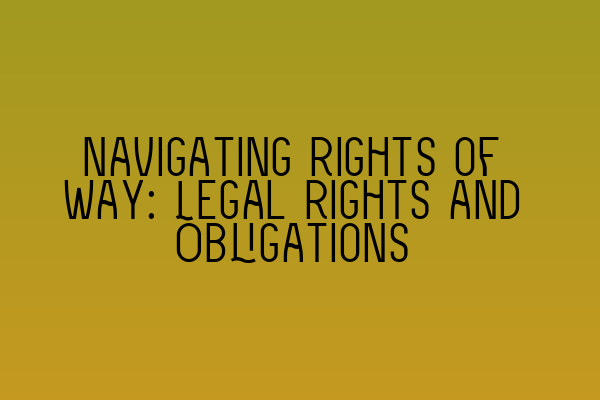Navigating Rights of Way: Legal Rights and Obligations
Introduction
When it comes to property law, rights of way can be a complex and often misunderstood area. Whether you are a homeowner, a landlord, or a tenant, understanding your rights and obligations regarding rights of way is crucial. In this blog post, we will delve into the legal framework surrounding rights of way, explore the various types of rights of way, and discuss the rights and obligations of both the grantor and the grantee. So, let’s begin our journey navigating the intricacies of rights of way!
Understanding Rights of Way
In simple terms, a right of way is a legal right that allows someone, usually the grantee, to travel across another person’s property. It is important to note that a right of way does not confer ownership of the land, but rather the right to use it for a specific purpose. Rights of way can be granted for various purposes, such as accessing a public road, reaching a neighboring property, or gaining access to utilities.
Types of Rights of Way
There are two main types of rights of way: express rights of way and implied rights of way.
1. Express Rights of Way: These rights of way are explicitly granted and documented in a legal document, such as a deed or a contract. They are created when the owner of the property, known as the grantor, transfers a specific right of way to another party, known as the grantee. This type of right of way is typically recorded at the Land Registry and is legally binding on subsequent owners of the property.
2. Implied Rights of Way: Unlike express rights of way, implied rights of way are not explicitly stated in a legal document. Instead, they are created by implication or necessity. For example, if a landlocked property has no other means of access except through a neighboring property, an implied right of way may be established to ensure reasonable access.
Rights and Obligations of the Grantor
As the grantor of a right of way, you have certain rights and obligations that you need to be aware of:
1. Right to Maintain and Alter: As the property owner, you have the right to maintain and alter the right of way, as long as it does not interfere with the grantee’s reasonable use of the right of way. However, any changes or alterations should not exceed the scope of the original grant.
2. Obligation to Allow Use: You have an obligation to allow the grantee to use the right of way for the specified purpose. This means that you cannot unreasonably obstruct or interfere with their use of the right of way.
3. Duty to Repair and Maintain: It is your duty to ensure that the right of way remains in a reasonable state of repair and is safe for use. If the right of way becomes obstructed or damaged, you should take prompt action to rectify the situation.
Rights and Obligations of the Grantee
As the grantee of a right of way, you also have rights and obligations that you should be aware of:
1. Right to Use: You have the right to use the right of way for the specified purpose. This includes the right to pass and repass over the property as necessary to access your own property or to fulfill the intended purpose of the right of way.
2. Obligation to Use Reasonably: While you have the right to use the right of way, you also have an obligation to use it reasonably and not cause unnecessary damage or inconvenience to the grantor or any other parties.
3. Duty to Contribute: In some cases, the grantee may have a duty to contribute towards the maintenance and repair costs of the right of way, especially if multiple parties share the same right of way. This is usually determined by the terms of the original grant or by local customs and practices.
Conclusion
Navigating rights of way can be a complex process, but understanding your legal rights and obligations is essential. Whether you are the grantor or the grantee, it is important to consult with a professional property lawyer who specializes in rights of way to ensure that your rights are protected and that you comply with your obligations. By doing so, you can navigate the intricacies of rights of way with confidence and peace of mind.
For more information on related topics, check out these articles:
– Misrepresentation in Contracts: Unveiling Deceptive Practices
– SQE Contract Law: Analyzing Landmark Cases and Influential Judicial Decisions
– Understanding Contractual Capacity: Rights and Limitations
– Interactive SQE Mock Tests for Contract Law: Test Your Knowledge
– Join Our SQE Contract Law Webinars: Expert Insights and Guidance
Remember, when it comes to rights of way, knowledge is power. Stay informed, consult legal professionals, and protect your rights!
Disclaimer: This article is for informational purposes only and does not constitute legal advice. It is always recommended to consult with a qualified solicitor for legal guidance specific to your situation.
